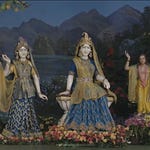So, the two nitya siddh gopis are eternally God-realized. One is Ved ṛichā gopi, and she is the one who is saying that Shyamsundar is hard-hearted, whilst Golok gopi is saying that he is so soft, so tender in heart. Why the difference of this opinion? Just understand it, so that when we practice devotion, we can remind ourselves of this philosophy.
See, there are different levels and different classes of devotion, and different limits of bhakti. Depending on the limit of our bhakti, of our devotion, the different class of our devotion, a different level of ras is received, a different level of happiness is received.
Even in the material world, with our material relationships, be it with the spouse, be it with the siblings, be it with the parents, any relationship, there are different, different levels or limits of our relationship. What we call love is not love. It’s all lust, but still, just to make you understand, I’ll just use the word love. That’s what you commonly call it, but it’s all lust as we know.
But in that relationship, let’s say, sometimes we have a lot more affection towards someone, and other times a lot less; with different people, there’s different amounts of our love. And then it’s fluctuating all the time as well. Sometimes the degree and the temperature of that love is so high and other times so low. We all know about this. I don’t have to talk much about it. We all live in this world and deal with it all the time. So there are ups and downs. Likewise, we have different levels, different limits and different classes, in the Divine phenomenon as well. Of course, with the Divine beloved, it’s nothing like the material relations of ours which is all based on only selfishness, lust, etc. But this Divine bliss, and Divine happiness that one attains depends on the class, on the limit, of the devotion.
Let me take you three days back when I had told you all about the different levels of sakam bhakti. Sakam bhakti is the selfish devotion. It’s not selfishness like the selfishness in the material world and material dealings. This selfish love means that the devotee is 100% surrendered totally to God, but in his surrender or in her surrender, the devotee has got these selfish desires. It is based on something, some condition. It could be beauty. It could be anything. Like Gajraj, the elephant, when he was caught by the crocodile he yelled out and screamed to the Lord to protect him for that reason. So this is selfish love.
Or like Draupadi’s love, she called out to Krishna for help when she was made to stand in front of the entire assembly and her sari was being pulled by the evil-hearted, evil-minded Dushasan. She was going to be made bare and naked in front of the entire assembly. This is known as selfish devotion. Draupadi is a selfish devotee. Why? Because she first cried out for help to her husbands and the society and the rest of the members, the gurus, acharyas, and everyone who was present in the assembly. She cried out. When she did not get any help from anyone and anywhere, then she tried her own strength.She was born out of fire. She had that strength which was unchallenged. So she thought,
“Okay, I’ll just try with my own strength!”
And she tried to put the sari in between her teeth, and hold it tightly. But with one jerk, the sari started getting loose. With the next jerk, the next pull, the sari would be gone.
So that’s when she cried out exclusively. Only then her mind and her heart surrendered to Krishna. Exclusively, she was then devoted to Shri Krishna and calling out for Shri Krishna,
एक भरोसो एक बल एक आस अति है
Ek bharoso, ek bal, ek ās ati hai.“I have only you!”
From her mind, from every pore and fiber of her being, internal, external, the thought of everyone was gone, even her own strength. The thought of her own bal, her own strength, was gone.
So not in words she’s saying, “I’m nothing,” but in reality, in truth.
A devotee like that, who is surrendered to God and Guru, but with some selfish feeling or condition is known as a sakam bhakt. So don’t start calling yourself a sakam bhakt. Sakam bhakti is a very, very high level.
So what are we then, nishkam bhakt? We are trying to be a bhakt. We are only trying to be a bhakt. We are actually trying to be very good sadhaks at the moment. Bhakti is very high. We are aspirants. We are not devotees, devotees in the true sense, like a bhakt. The word bhakt means the one who is devoted and has already surrendered. We are sadhaks. And we are trying to be good sadhaks at the moment.









